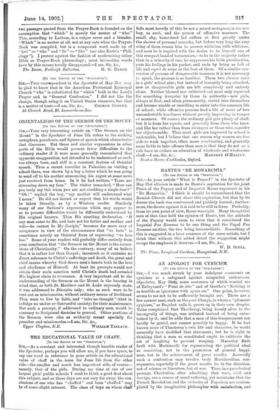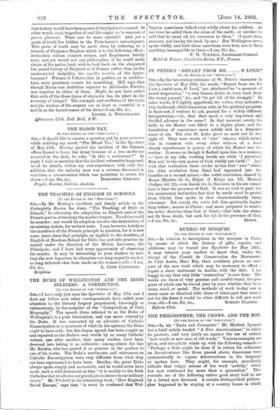AN APOLOGY FOR CYNICISM.
[TO THE EDITOR OF THE 'SPECTATOR."] Szn,—I was much struck by your indulgent comments on cynicism as a safeguard against misguided enthusiasm (Spectator, May 31st), some sentences of which remind me of Talleyrand's "Point de zele" and of Groethe's "Nothing is so terrible as ignorance with spurs on." One point, however, seems to me not to be sufficiently brought out. There are a few earnest men, such as the poet Clough, in whom a "pleasant cynicism," as Bagehot calls it, grows up in their own despite. Taine complained that Thackeray, being keenly alive to the incongruity of things, was irritated instead of being enter- tained by it; and he adds that a man of this temperament can hardly be genial, and cannot possibly be happy. If he had known more of Thazkemy's own life and character, he would assuredly have modified that statement ; but he is right in thinking that a man so constituted ought to cultivate the art of laughing to prevent weeping. Macaulay finds fault with Machiavelli for representing the political ideal as consisting, not in the promotion of general happi- ness, but in the achievement of great results. Assuredly such a contention may involve truly Machiavellian con- sequences, especially if the great results lie in the direction, not of science or literature, but of war. Thus, in a paradoxical passage, Cherbuliez, after admitting that wars, civil and foreign, are a source of cruel suffering, yet maintains that the French Revolution and the victories of Napoleon are contem- plated by the imaginative philosopher with satisfaction, and that history would have been poorer if they had not occurred. In other words, such tragedies of real life ought to be enacted ut pueris placeant. What can be more cynical ? And yet a grain of truth lies hidden in the Frenchman's extravagance. This grain of truth may be made clear by referring to a remark of Fitzjames Stephen which is to the following effect : Icelanders seldom commit crimes, and Esquimaux hardly ever; and yet would not any philosopher, if he could make choice of his native land, wish to look back on the chequered but grand history of England or of France rather than on the unchronicled insipidity, the sepulta inertia, of the hyper- boreans ? Whence it follows that in politics, as in architec- ture, mere greatness counts for something. Mill says that though Nicias was doubtless superior to Alcibiades. Pericles was superior to either of them. Might he not have added that each of the three types of character has its place in the economy of things ? The strength and swiftness of the eagle and the wisdom of the serpent are at least as essential to a nation as the harmlessness of the dove.—I am, Sir, &c., LIONEL A. TOLLEMACHE.
dithenmum Club, Pall Mall, S.W.











































 Previous page
Previous page